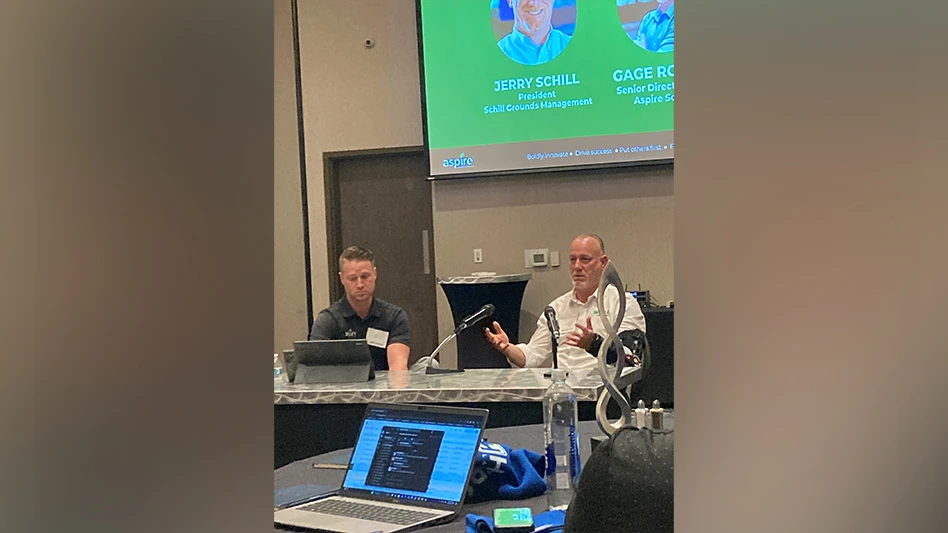
When Jerry Schill started his landscaping company decades ago, he never thought it’d be as big as it is today. Schill admits he and his brother weren’t trying to run a million-dollar business, they just wanted to make enough money to be able to support their families.
Nowadays, Schill Grounds Management has 29 locations across eight states (plus Canada). They ranked no. 28 on this year’s Lawn & Landscape Top 100 List with over $104 million in revenue.
Schill shared his journey to reaching such high revenue numbers, his experiences with private equity and more during a recent Lunch & Learn titled “From Seed to Sale: A Private Equity Playbook for Landscapers” hosted by Aspire. Schill's panel discussion was moderated by Gage Roberts, Aspire's senior director of sales.
Schill’s steps to success included five areas of advice he says business leaders should work on to attract private equity interest and grow their company.
1. Don’t Try to Be Everything to Everyone
Schill acknowledges the company used to be a lot more diversified in the services they offered, but there came a point when he realized simplifying would not only allow them to serve their clients better — but also be more profitable.
“It’s important to remember your core values will always remain the same, but your strategies and goals will change as the business continues to grow,” he says. “You have to step back and reevaluate at some point.
“We were doing everything for everybody,” Schill adds. “We were even cleaning up dog crap on Fridays for $75 a stop — or filling sandboxes in the spring — it was anything we could do to make money and generate a little bit of buzz about the organization.”
Deciding to consolidate services means the business went through several iterations before committing solely to commercial landscaping.
Schill credits the decision to attend an industry conference where he said one of the speakers really focused on the idea of thinking strategically and focusing on what you’d be best at.
“We really started to narrow our focus,” Schill says. “Eventually we went from Schill Landscape Development to Schill Grounds Management.”
2. Network, Network, Network!
For Schill, the next thing that’d helped him thrive was networking and building relationships with others in the green industry.
“We networked heavily — whether that was with our customers, agencies the government provided or anyone else,” he says. “We were always eager to learn what we could from them.
Schill says he enjoys how collaborative this industry is and how open and willing others are to share their strengths and weaknesses.
“Everybody starts at zero — that’s the one thing we all have in common,” Schill adds. “You have to leverage the wisdom of those in the room and seek out somebody who’s doing something really well that you aren’t doing. Seize the opportunity to learn from them.”
Schill notes that having those trusted advisors to provide really good, honest feedback is critical.
3. Build Up a Great Leadership Team Around You
As a business grows, the leader needs to recognize they can no longer take the reins alone and need to start delegating tasks. This means you need a strong, reliable leadership team to depend on.
“If you focus on the right things, which is people, good things start to happen,” Schill says
Schill admits initially that he was hesitant to change — especially after entering the private equity world and quickly acquiring numerous other companies. He said it was then that he relied on his team the most.
“I had to figure out how to prioritize my time and how to own that role versus having the role own me,” he says. “It’s been tricky. Change is hard.”
Schill adds it’s exciting though to find the best employees and get them engrained in the company’s culture and even the industry — as he notes they are the future of it.
“Our job is to replace ourselves and prop up the next generation of leaders, not only in our organization but in the industry,” Schill says.
Schill says the best way to get buy-in from your leadership team is just by being yourself — there should be no smoke and mirrors.
“You have to try and get people excited,” Schill says. “When you’re authentic, people realize that.”
He adds that finding people who excel at the skills you don’t is another important step in the process. Schill says he knew he needed people around him who could take any task or idea from inception to completion quickly.
“You have to have people around you that make up for your shortcomings,” he says. “I’ll be honest: I’m the best 85% guy around, I don’t finish much of anything. I never have in my entire life, and I recognize that so it’s important to have people around me who can take the time to do it.”
4. Fully Embrace Technology
Schill says technology is so important to him and Schill Grounds Management that he’s not sure how any company can expect to grow exceptionally without it.
“You can’t afford not to be using some kind of platform to run your business in 2024,” he says. “If you want to run any kind of meaningful business and scale it you have to have a technology stack within your organization. You cannot operate in today’s fast-paced world without it. You need to make decisions immediately — not 40 days from now when you close your books.”
Schill suggests leaders settle on an operating system, fully embrace it, get everyone to buy in completely and make it a true hub.
“If you’re spending money on technology and you’re still doing workarounds — then you’re doing yourself a disservice,” he says.
Schill adds that having technology and reliable data is essential for those looking to sell their business one day.
He says without it a company might not get much PE interest, or worse, they will be undervalued.
“Getting ready to exit is a process — and software plays an important role in that,” he says. “There’s a lot of data that’s needed and investors need to ensure that their investment will be protected…You will inevitably leave money on the table. You will shortchange yourself. It’s important to make sure you have things in order.”
5. Be Ready to Sell — But Take Your Time!
So, when it does become time to sell, Schill says owners should take their time.
He also likens the experience to being a lot like dating — and warns that owners should not only keep an eye out for any red flags but know what they want ahead of time before entering into the process.
“I sat down and made a list of things that were non-negotiable for me,” Schill says. “It’s like dating. It’s not just about the business. Sometimes you meet and you know Day 1 that it’ll be a fit. Sometimes you have to go through a lot more meetings to find the one.”
Just like in dating you don’t want to move too fast. Schill warns that owners should be doing just as much research on a prospective buyer as that person or entity is doing on you.
“Vet them as much as they’re vetting you,” he says. “It is a journey and shouldn’t be taken lightly. Every deal we’ve done where the owner moves fast hasn’t been as fruitful for them.”
While Schill has found so much success since entering the private equity space, he admits that not all deals turn out well.
“We’ve had a couple dumpster fires — I’ll be honest,” he says. “The worst one we did was where we only talked to the owner beforehand. The day we met the management team it was chaos. They felt betrayed by the owner, they were scared, there were all these things that needed to be talked about.”
And while confidentiality is normal in these kinds of circumstances, Schill acknowledges you really do need buy in from the entire team in order to make it a smooth transition of power.




